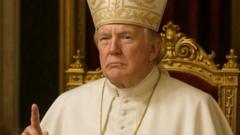In a controversial move, Donald Trump has pardoned over 1,500 individuals linked to the Capitol riots, leading to the release of key figures Tarrio and Rhodes.
Capitol Riot Leaders Tarrio and Rhodes Freed as Trump Issues Sweeping Pardons

Capitol Riot Leaders Tarrio and Rhodes Freed as Trump Issues Sweeping Pardons
Former Proud Boys and Oath Keepers heads released following mass commutations by the ex-president.
The recent wave of pardons issued by former President Donald Trump has resulted in the release of significant leaders from the Capitol riot. Henry "Enrique" Tarrio, the former leader of the Proud Boys, and Stewart Rhodes, founder of the Oath Keepers, were both set free shortly after Trump commuted sentences and pardoned over 1,500 individuals involved in the violence that shook the nation's capital four years ago.
Trump's actions come within a day of the pardons, which have reignited debates surrounding the Capitol riots on January 6, 2021. Zuny Tarrio proudly announced on social media that her son was officially released from prison. In contrast, Stewart Rhodes, who had his sentence commuted but not pardoned, remained at the jail awaiting the departure of fellow defendants.
Rhodes, a Yale-educated attorney and former U.S. Army paratrooper, orchestrated a group of Oath Keepers in Washington, although he personally refrained from entering the Capitol. He was sentenced to 18 years in prison for his actions during the riot. Conversely, Tarrio received a 22-year sentence on charges of seditious conspiracy, a rare and serious charge connected to plotting an attack on the government while absent from the riot scene.
In a wider effort to influence ongoing legal proceedings, Trump issued an order for the Department of Justice to dismiss all unresolved cases against those implicated in the insurrection. Edward R. Martin, a well-known advocate for these defendants, was appointed acting U.S. Attorney for Washington D.C., indicating the depth of Trump's involvement in assisting these individuals.
Critics, primarily from the Democratic Party, have sharply condemned these releases, citing it as a blatant attempt to distort history and diminish the violence of the riot that resulted in multiple fatalities. Trump, in his characterization, has called the event "peaceful" and framed the imprisoned rioters as "hostages" of the legal system.
Trump's actions come within a day of the pardons, which have reignited debates surrounding the Capitol riots on January 6, 2021. Zuny Tarrio proudly announced on social media that her son was officially released from prison. In contrast, Stewart Rhodes, who had his sentence commuted but not pardoned, remained at the jail awaiting the departure of fellow defendants.
Rhodes, a Yale-educated attorney and former U.S. Army paratrooper, orchestrated a group of Oath Keepers in Washington, although he personally refrained from entering the Capitol. He was sentenced to 18 years in prison for his actions during the riot. Conversely, Tarrio received a 22-year sentence on charges of seditious conspiracy, a rare and serious charge connected to plotting an attack on the government while absent from the riot scene.
In a wider effort to influence ongoing legal proceedings, Trump issued an order for the Department of Justice to dismiss all unresolved cases against those implicated in the insurrection. Edward R. Martin, a well-known advocate for these defendants, was appointed acting U.S. Attorney for Washington D.C., indicating the depth of Trump's involvement in assisting these individuals.
Critics, primarily from the Democratic Party, have sharply condemned these releases, citing it as a blatant attempt to distort history and diminish the violence of the riot that resulted in multiple fatalities. Trump, in his characterization, has called the event "peaceful" and framed the imprisoned rioters as "hostages" of the legal system.























